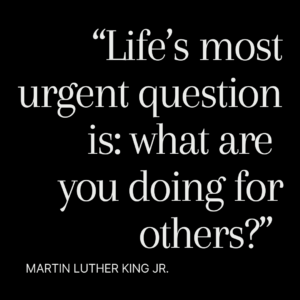 Honoring Dr. Martin Luther King Jr.’s legacy is deeper than his famous quotes and speeches. This year, we are honoring his legacy through action. King believed that all people should be able to belong and contribute meaningfully within their communities, and that anti-blackness and oppression prohibit community care.
Honoring Dr. Martin Luther King Jr.’s legacy is deeper than his famous quotes and speeches. This year, we are honoring his legacy through action. King believed that all people should be able to belong and contribute meaningfully within their communities, and that anti-blackness and oppression prohibit community care.
In our individualistic world, it’s vital to cultivate opportunities for young people to meaningfully contribute to the world around them. As children build and practice self-advocacy skills, they also can tune into what their community needs and how they can support one another.
Step back and allow your child to identify causes they care about and to take action to meaningfully contribute to a more just world. Here are a few ideas to get started or add to what you already do in your family:
Validate ideas and feelings
Learning how to advocate for yourself is a foundational building block for advocating for and with others. A key step in self-advocacy is “the ability to recognize and understand emotions, and strategies to express those emotions in ways that are constructive and appropriate.”
Instead of telling your child how they should feel (I.e, “Stop crying, you’re okay”), allow them to name their own feelings. Self-awareness is a building block of self-advocacy and is difficult to practice if our feelings are constantly dismissed when we try to communicate them.
Validate your child’s feelings and ideas. This helps support their selfhood and self-advocacy skills by building trust in their own ability to identify their feelings, needs, and ideas.
Offer Choices for Community Care
When our kids have ideas to help with community problems that we think won’t work, it’s easy to immediately shut them down. Instead, try to offer alternatives and choices. For example, if your child wants to end homelessness by buying everyone a home, you can practice validating their feelings while providing other options that are more feasible. Communicating to your child about why their idea doesn’t work for your family situation is also helpful modeling of self-advocacy.
Practice, Practice, Practice
In a world that encourages compliance and individualism, self-advocacy and community care in action can be scary and daunting. Just like reps at the gym, practicing self-advocacy and opportunities for community advocacy builds skills and comfortability with identifying feelings, asking for what we need, and learning effective advocacy methods.
Provide Opportunities for Community Advocacy
Once your child has some self-advocacy practice under their belts, expanding to community advocacy is a natural next step. Based on your child’s interests, brainstorm community causes with your child and find ways to get involved. This could look like volunteering regularly, organizing a Day of Service with friends and family, or spending intentional time together learning more about social injustices and examples of social change movements.
When kids participate in something bigger than themselves, they can witness and experience that real change is possible.
Opportunities for community contributions are year-round, not just on Martin Luther King Jr. Day. Build community care and advocacy opportunities into your family’s calendar and routine to ensure your actions match your values as we build a more just world together.
Kayla Blau is a Sound Discipline Facilitator
